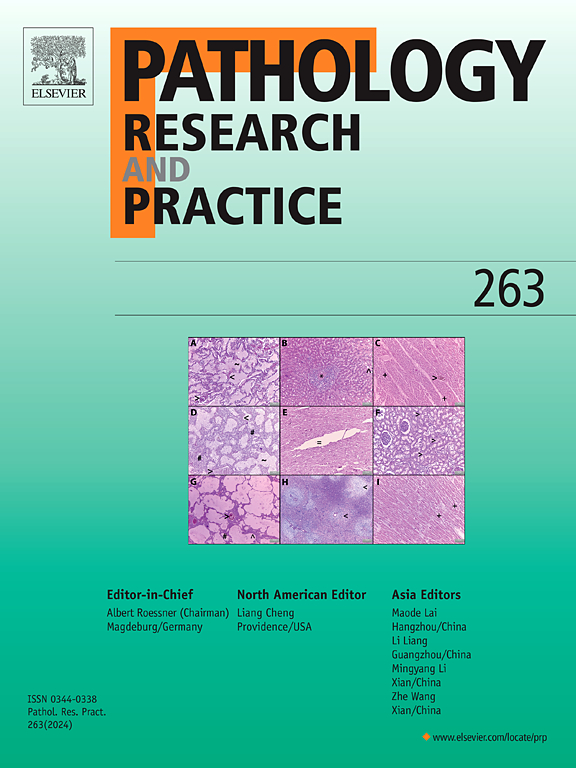Triazolo-indazole-trione-mediated disruption of Wnt/β-catenin pathway drives both autophagic and paraptotic cell deaths in colorectal cancer cells
IF 3.2
4区 医学
Q2 PATHOLOGY
引用次数: 0
Abstract
Aberrant activation of the Wnt/β-catenin signaling pathway is a hallmark of numerous human cancers, including colorectal carcinoma. Targeting this pathway has been shown to effectively induce cancer cell death and inhibit tumor progression. In this study, we investigated the anti-tumor effects of HR10, a novel synthetic compound, in colorectal carcinoma cells. HR10 significantly suppressed cell viability in HCT-116, HCT-15, HT-29, and SNU-C2A cells while having minimal impact on normal colon cells. Mechanistically, HR10 induced autophagy by upregulating Atg7, p-Beclin-1, and Beclin-1, and triggered paraptosis through the downregulation of Alix, a key inhibitor of this process. Additionally, HR10 increased reactive oxygen species (ROS) levels, disrupted mitochondrial membrane potential, and activated ER stress by elevating ATF4 and CHOP expression. Moreover, HR10 inhibited the Wnt/β-catenin pathway by downregulating β-catenin, Wnt3a, and FZD-1, while enhancing β-TrCP and p-GSK3β (Tyr216). Knockdown of β-catenin further confirmed that HR10-mediated autophagy and paraptosis were directly associated with the suppression of the Wnt/β-catenin signaling cascade. These results highlight the dual mechanisms of autophagy and paraptosis induction, positioning HR10 as a promising therapeutic candidate for colorectal cancer. Overall, our findings demonstrate that HR10 effectively targets the Wnt/β-catenin signaling pathway, inducing autophagic and paraptotic cell death, and providing a potential therapeutic strategy for colorectal carcinoma.
三唑唑-茚唑-三酮介导的Wnt/β-catenin通路中断驱动结直肠癌细胞自噬和旁凋亡细胞死亡
Wnt/β-catenin信号通路的异常激活是包括结直肠癌在内的许多人类癌症的标志。靶向这一途径已被证明可以有效地诱导癌细胞死亡并抑制肿瘤进展。在本研究中,我们研究了一种新的合成化合物HR10对结直肠癌细胞的抗肿瘤作用。HR10显著抑制HCT-116、HCT-15、HT-29和SNU-C2A细胞的细胞活力,而对正常结肠细胞的影响最小。从机制上讲,HR10通过上调Atg7、p-Beclin-1和Beclin-1诱导自噬,并通过下调该过程的关键抑制剂Alix触发细胞凋亡。此外,HR10增加活性氧(ROS)水平,破坏线粒体膜电位,并通过提高ATF4和CHOP的表达激活内质网应激。此外,HR10通过下调β-catenin、Wnt3a和FZD-1来抑制Wnt/β-catenin通路,同时增强β-TrCP和p-GSK3β (Tyr216)。β-catenin的敲低进一步证实了hr10介导的自噬和细胞凋亡与Wnt/β-catenin信号级联的抑制直接相关。这些结果强调了自噬和凋亡诱导的双重机制,将HR10定位为有希望的结直肠癌治疗候选药物。总之,我们的研究结果表明,HR10有效靶向Wnt/β-catenin信号通路,诱导自噬和旁凋亡细胞死亡,为结直肠癌提供了潜在的治疗策略。
本文章由计算机程序翻译,如有差异,请以英文原文为准。
求助全文
约1分钟内获得全文
求助全文
来源期刊
CiteScore
5.00
自引率
3.60%
发文量
405
审稿时长
24 days
期刊介绍:
Pathology, Research and Practice provides accessible coverage of the most recent developments across the entire field of pathology: Reviews focus on recent progress in pathology, while Comments look at interesting current problems and at hypotheses for future developments in pathology. Original Papers present novel findings on all aspects of general, anatomic and molecular pathology. Rapid Communications inform readers on preliminary findings that may be relevant for further studies and need to be communicated quickly. Teaching Cases look at new aspects or special diagnostic problems of diseases and at case reports relevant for the pathologist''s practice.

 求助内容:
求助内容: 应助结果提醒方式:
应助结果提醒方式:


